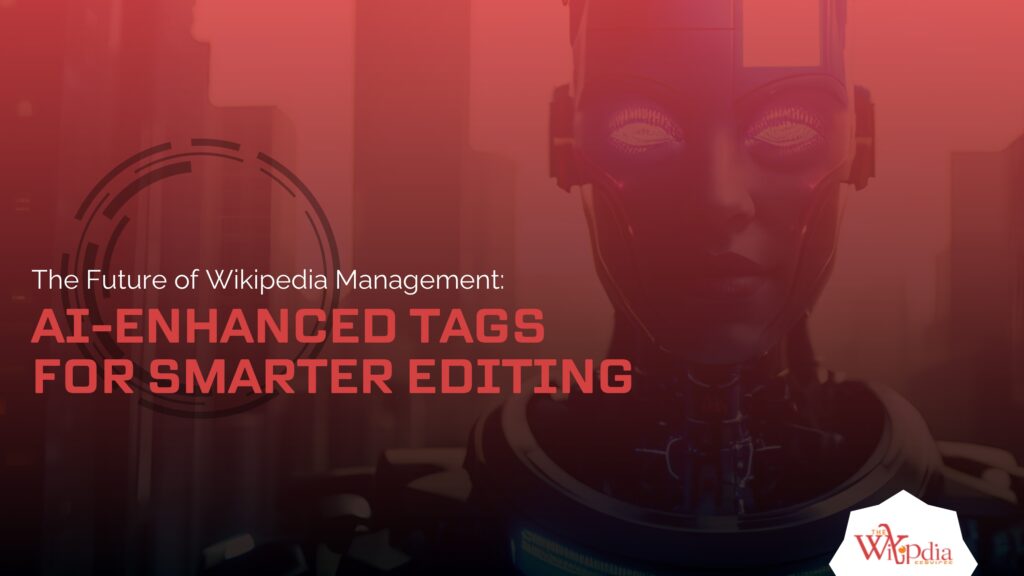Wikipedia is one of the most influential resources of data on the internet. It is accessed via thousands and millions of customers every day, making it essential for companies, public figures and organizations to manage their Wikipedia pages properly. However, keeping a Wikipedia page is not always as easy as it seems. Strict tips, constant updates and the threat of misinformation require cautious Wikipedia management to ensure accuracy and credibility.
With the rise of artificial intelligence (AI), Wikipedia management is undergoing a significant transformation. AI enhached tags are improving the editing method making it easier to maintain well organized and dependable content material.
In this weblog, we will explore how AI is shaping the future of Wikipedia the position of professional Wikipedia editors and how Wikipedia consultants assist individuals and organizations defend their Wikipedia reputation.
Understanding Wikipedia Management
Wikipedia is a user generated platform, meaning everybody can edit its pages. However, these edits should adhere to strict guidelines. Pages need to be properly researched, unbiased and backed by the reliable sources. Failing to fulfill Wikipedia’s requirements can result in web page removal or harmful misinformation being spread.
Why is Wikipedia Management Important?
- Credibility and Reputation: A properly maintained Wikipedia page complements credibility and strengthens a brand’s online presence. Conversely, misguided or biased content can harm an enterprise’s or individual’s Wikipedia reputation.
- Preventing Vandalism: Since Wikipedia allows public editing, pages are at risk of vandalism and fake data. Proper Wikipedia management ensures that misleading edits are speedily corrected.
- Search Engine Ranking: Wikipedia pages regularly rank excessively on Google. Well-optimized pages maintained by professional Wikipedia editors can assist organizations and people enhance their online visibility.
- Compliance with Wikipedia’s Guidelines: Wikipedia has strict regulations concerning neutrality, verifiability and notability. Proper Wikipedia control guarantees that content material remains inside those recommendations to prevent removal or disputes.
Given these challenges, many people are searching for help from Wikipedia consultants who specialize in growing and maintaining Wikipedia pages.
The Role of AI in Wikipedia Management
Artificial intelligence is revolutionizing many industries and Wikipedia control is no exception. AI-enhanced tags are designed to streamline the editing process, improving accuracy and performance. Let us uncover how AI is transforming Wikipedia.
1. Detecting and Correcting Errors
AI-powered tools can scan the Wikipedia pages to identify grammatical errors, authentic inconsistencies and missing citations. This reduces human effort and complements the reliability of Wikipedia content.
2. Monitoring Wikipedia Reputation
Maintaining a fantastic Wikipedia reputation is important for people and companies. AI-enhaced tags can detect edits that introduce biased language, misinformation or potential defamation. This permits Wikipedia consultants to take brief action earlier than dangerous content material spreads.
3. Automating Page Translation
Wikipedia is to be had in more than one language, however manually translating pages is time-consuming. AI-enhanced tools are improving web page translation making it less complicated to create and hold multilingual Wikipedia pages with accurate and contextually suitable translations.
4. Enhancing Collaboration Among Editors
AI-powered pointers help editors perceive regions that want improvement, suggest citations and highlight ability conflicts in Wikipedia rules. This makes collaboration among expert Wikipedia editors more productive and efficient.
5. Detecting Unreliable Sources
One of the largest challenges in Wikipedia is ensuring that all the information comes from dependable sources. AI can examine citations and flag assets that can be outdated, biased or unreliable, helping maintain the Wikipedia’s credibility.
Why You Need Professional Wikipedia Editors
While AI-enhanced tools are improving Wikipedia management human expertise are still very important. Professional Wikipedia editors play an important role in ensuring that content material meets Wikipedia’s strict editorial standards. Here is why hiring a professional is beneficial:
1. Expertise in Wikipedia Guidelines
Wikipedia has unique guidelines regarding neutrality, verifiability and reliable sourcing. Professional Wikipedia editors recognize these guidelines and ensure that all content complies with Wikipedia’s rules.
2. Preventing Biased or Promotional Content
Wikipedia discourages self-promotion and biased content material. A Wikipedia professional guarantees that content remains neutral, keeping off conflicts with Wikipedia’s policies.
3. Handling Wikipedia Reputation Issues
If a Wikipedia page contains the negative or wrong information coping with it requires experience. Wikipedia experts can assist manage Wikipedia reputation by ensuring that content material is authentic, nicely sourced and aligned with Wikipedia’s guidelines.
4. Avoiding Page Deletion
Wikipedia has strict notability necessities. If a page does not meet those requirements it could be deleted. Professional Wikipedia editors make sure that the pages are well-researched and well formatted to prevent deletion.
Wikipedia Consultants: How They Help
Wikipedia specialists offer expert assistance for individuals and businesses in search of to create or improve Wikipedia pages. Their services consist of:
- Page Creation: Crafting nicely-researched Wikipedia pages that meet Wikipedia’s guidelines.
- Content Updates: Ensuring that the information remain correct and up to date.
- Reputation Management: Handling disputes, negative edits and keeping a fantastic Wikipedia reputation.
- Page Translation: Assisting with multilingual Wikipedia pages through AI-enhanced page translation tools.
AI and the Future of Wikipedia Management
As the AI era continues to conform, the future of Wikipedia management appears promising. Here are some advancements that we can expect in the coming years:
1. More Advanced AI-Enhanced Tags
Future AI tools will become even more better at identifying unreliable resources, detecting biased content and automating complicated editing tasks.
2. Real-Time Monitoring and Alerts
AI may soon offer real-time indicators for professional Wikipedia editors notifying them of potentially damaging edits that require immediate attention.
3. Improved Page Translation Accuracy
AI-powered page translation will continue to enhance ensuring that Wikipedia content is obtainable and accurate across different types of languages.
4. AI-Powered Content Suggestions
Future AI systems may also provide automated content material suggestions primarily based on current developments making sure Wikipedia pages remain modern and well-maintained.
5. Automated Conflict Resolution
AI tools would serve as a resolving solution for editing disputes through detection of violations and automated generation of neutral and properly sourced content suggestions.
Conclusion: The Perfect Balance of AI and Human Expertise
The future of Wikipedia management is a combo of AI-powered efficiency and human expertise. While AI-enhanced tags are making editing smarter and more efficient the function of professional Wikipedia editors and Wikipedia consultants remains critical.
Businesses, individuals and organizations seeking to preserve a strong Wikipedia reputation ought to stay ahead of those advancements. By leveraging AI tools even as counting on experienced editors, Wikipedia pages may be managed effectively ensuring credibility and accuracy.
Are you seeking out professional Wikipedia management services? Hiring an expert can make all of the difference. Whether you need web page creation, updates or page translation professional guidance guarantees that your Wikipedia web page remains dependable, neutral and impactful.


